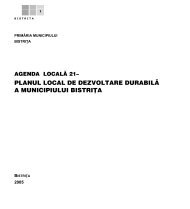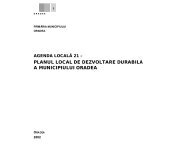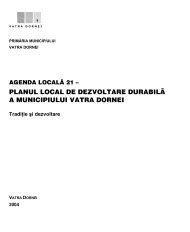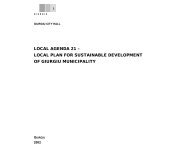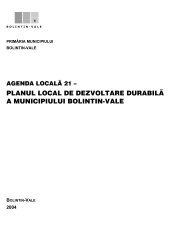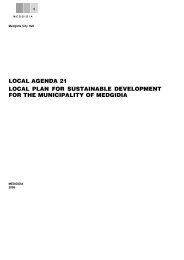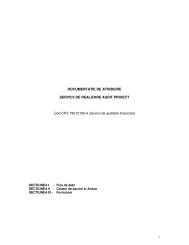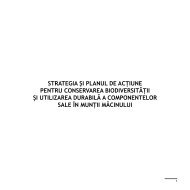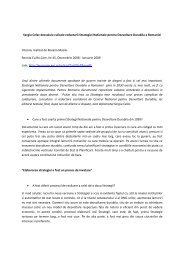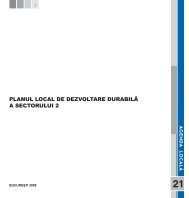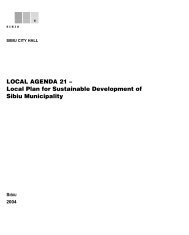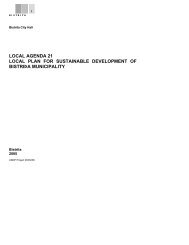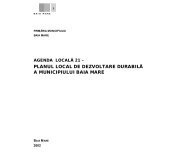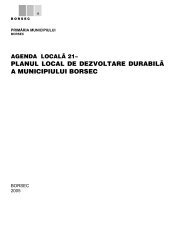English Version - United Nations Development Programme Romania
English Version - United Nations Development Programme Romania
English Version - United Nations Development Programme Romania
Create successful ePaper yourself
Turn your PDF publications into a flip-book with our unique Google optimized e-Paper software.
CHAPTER 3<br />
The Judicial Framework<br />
20<br />
3.1. Reference Points for a Potential Judicial Framework for Sustainable<br />
<strong>Development</strong><br />
Transposing the objectives of sustainable development to a judicial level involves a preliminary<br />
assessment of the legislation adopted since 1989, as well as establishing a legislative agenda according to<br />
the priorities that have been identified. This action must take into account the obligation to comply with<br />
the legislation already in force in the E.U., the obligation to observe the international agreements and<br />
conventions on the protection of the environment that <strong>Romania</strong> signed. The financial means of <strong>Romania</strong>,<br />
as well as the need to maintain a balance between the quality of life and the economic growth must be had<br />
in view.<br />
The systematisation of the judicial framework according to the objectives and principles set forth<br />
by the National Strategy for Sustainable <strong>Development</strong> can only begin as soon as the property issue is<br />
clarified judicially and practically, i.e., by governmental implementation programs.<br />
The reference points for the judicial framework regarding sustainable development are the<br />
following:<br />
Remodelling the rules for corporate and public management;<br />
Improvement of the institutionalised partnership system;<br />
Regulation of access to public information;<br />
Securing a clear and strict interpretation of the legis lation, especially in fiscal and commercial<br />
law, by means of the Legislative Council and ministries;<br />
Introduction of regulations and the improvement of the market mechanisms;<br />
Clearer regulation of public services;<br />
Securing the conservation and protection of natural resources (the dimensioning of the agricultural<br />
yield, the protection of forests, the quality of water resources, the prevention of climatic<br />
changes, the management of waste, the quality of air, public food catering etc.);<br />
Preventing environmental deterioration;<br />
Promoting the investment of domestic and foreign capital in projects carried out to ensure the<br />
environmental protection, taking into account short, medium and long -term priorities;<br />
Reforming the labour law (organisation of the labour market, payment according to efficiency,<br />
social security network, the equitable regulation of unemployment, in granting compensations<br />
and in operating mass dismissals etc.);<br />
Human settlements, land planning, rural development (urbanisation problems, the overcrowding<br />
of infrastructures, transportation, air pollution, noise etc.);<br />
Reorganisation in the field of scientific and technological research, education, professional training<br />
and ecological education;<br />
The improvement of the legislative framework regarding the communications and information<br />
technology in order to attract large investments;<br />
The elaboration of a Moral Code of the Environment that would lead to the gradual elimination of<br />
those practices that focus only on short-term profits and would determine changes in behaviour, the<br />
primacy of ethical values, solidarity, equitability etc;<br />
The introduction of the Environmental Fund in the legislative system;<br />
3.2 Prospects<br />
According to section 3.6 of Agenda 2000, <strong>Romania</strong> will need to earmark substantially larger<br />
financial resources to protect the environment, develop the administrative capacity required to implement<br />
the necessary measures and would also have to harmonise its legislation with that of the European Union.<br />
These laws require a massive investment and considerable efforts on the part of the administrative bodies<br />
– “full compliance with the European norms could be guaranteed in the long-run”.<br />
The present strategy allows <strong>Romania</strong> to gradually eliminate most of the deficiencies and in the long run to<br />
satisfy the European requirements and standards, which implicitly means to meet the requirements for a sustainable<br />
development, including an adequate legislative framework.



